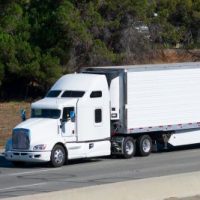Do Company Cars Count As Commercial Motor Vehicles?

U.S. federal law and state law define commercial motor vehicles (CMVs) very specifically, usually in terms of weight and cargo type. However, many vehicles are often excluded from the CMV classification that still qualify as commercial vehicles in other respects. One of the most common is the company car – legally, it may not meet the benchmarks to be a CMV, but its driver is still often acting on their employer’s business, and their employer may still be liable for the injuries they cause.
Requirements For CMV Status
Florida defines a commercial motor vehicle as having certain characteristics: namely, (1) not being operated by any kind of governmental entity; (2) using ‘special or motor fuel’ on public highways; and (3) weighing at least 26,001 pounds or more or has three or more axles. The weight limit will generally exclude most company cars, but not necessarily company vans or larger vehicles. That said, this does not mean that the driver of a company car would not be held liable for any damages caused by their personal negligence; nor does it mean that their employer might not be liable as well.
Florida law observes a legal theory known as vicarious liability, or respondeat superior, under which an employer can be held liable for the torts (essentially civil crimes) of their employees. If an employee can be shown to have committed the tort while engaged in their employment – that is, if they were acting at least partially in furtherance of their employer’s interests – their employer can be held liable. Given that commercial vehicle drivers are effectively doing their job by driving, it is often possible to hold an employer vicariously liable.
Holding A Driver Liable
In Florida, most vehicles that use state roads must observe the same rules and carry the same insurance protection. Florida is a no-fault auto insurance state, meaning that instead of filing suit against a driver who caused them harm in most cases, an injured plaintiff must file a claim with their personal injury protection (PIP) insurer to try and recover for what they have been through. All Florida drivers, both private and commercial, must carry PIP coverage – though statistics estimate that as many as one-quarter of Floridians do not have the required insurance.
What this means is that if a private automobile is involved in an accident with a company car or other commercial vehicle, the injured driver must seek compensation from their PIP insurer – however, there is an exception to this rule. If a person’s injuries are “significant and permanent,” they are permitted to file suit against the person who caused those injuries – the rationale is that if injuries are that significant, it is better to force the tortfeasor to pay for them, instead of putting that burden on an insurer.
Call A Tampa Commercial Vehicle Accident Attorney
If you have been involved in an accident with a company car or van, they may not qualify as a commercial motor vehicle, but it still may be possible to seek compensation for your injuries from the driver (or their employer). A Tampa truck accident attorney from the Rinaldo Law Group can help answer any questions you might have about the legal process. Call our office today for a free consultation.
Source:
flsenate.gov/Laws/Statutes/2021/320.01












